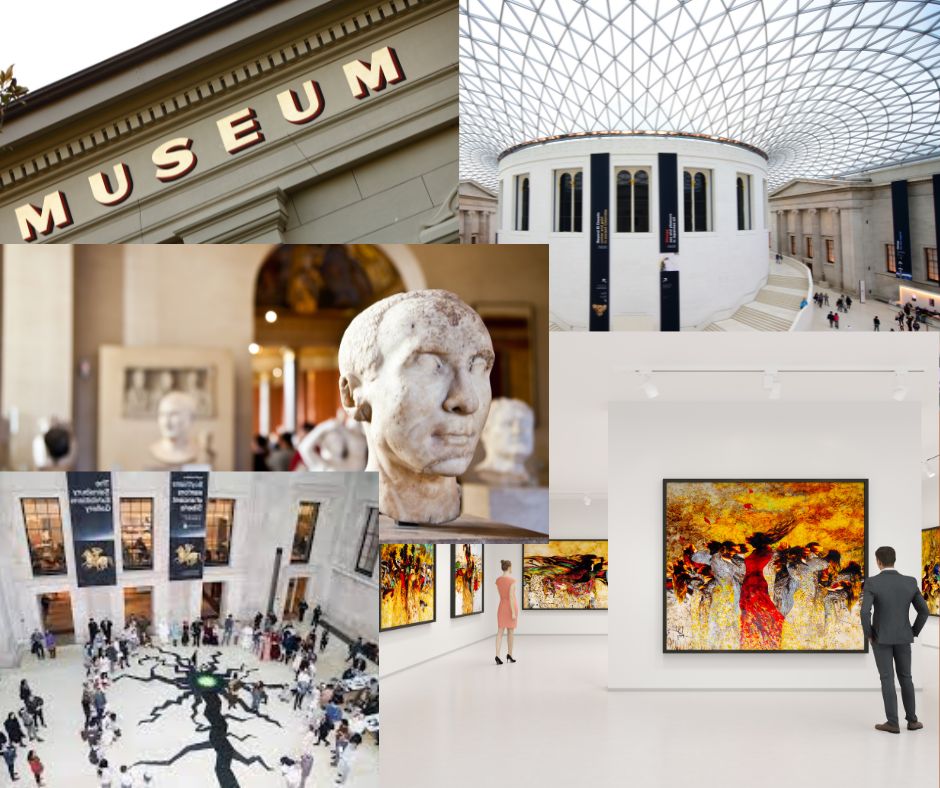
This summer, the effects of climate change were felt at the British Museum. During the July heatwave, which saw temperatures top 40°C for the first time in the United Kingdom, the 269-year-old institution was compelled to close early for safety reasons. The nation’s first-ever red-level heat warning and a national emergency were both caused by the heatwave. Climate change activists, who continue to urge the British Museum to sever its long-term sponsorship agreement with British Petroleum, were not unaware of the irony (BP).
The World of Stonehenge, a recent display at the British Museum that ended in July, and Hieroglyphs: Unlocking Ancient Egypt, which begins in October, were directly sponsored by the oil giant.
According to financial documents released in August, BP increased its earnings to about £7 billion in the second quarter of 2022, partly due to high oil prices brought on by Russia’s invasion of Ukraine. Just as homes, businesses, and institutions across the nation began to recognise the seriousness of rising energy bills, the unsettling details came to light.
According to Friederike Otto, a senior lecturer in climate science at the Grantham Institute at Imperial College London, the connection between extreme weather and the use of fossil fuels has never been more apparent. He claims that, like all current heatwaves and droughts worldwide, this one is being caused by climate change.
How BP Funds The Arts And Why You Should Be Concerned
The British Museum is under increasing pressure to discontinue accepting donations from fossil fuel companies as public concern over the problem grows (the most recent Ipsos poll revealed that 84% of British citizens are concerned about climate change).
To stop oil companies from funding the arts, Chris Garrard, co-director of the Culture Unstained advocacy group, said: “By supporting exhibitions and art prizes, corporations like BP strive to normalise their brand. They virtually merge with the art and culture themselves. It enhances their social standing.
Sponsoring a museum, however, is more than just a method of art-washing, according to Garrard. He asserts that BP will utilise its link with the British Museum to forge connections with powerful government officials. “Sponsoring the arts is a significant component of their lobbying approach for fossil fuel firms like BP,” he claims. Behind the scenes, it enables them to meet in these locations and mingle with government officials.
According to Garrard, BP funded and sponsored a series of events celebrating the Mexican Day of the Dead holiday held at the British Museum in 2009. He said it allowed BP executives to have champagne with Mexican government representatives. BP received new permits to drill for oil in the Gulf of Mexico a few months later. The museum says they don’t support the company’s operations. They practically participate in extracting more fossil fuels from the ground.
According to Garrard, the “revolving door” of corporate influence on the boards of cultural institutions is real. He explained, “The former UK chancellor George Osborne is chair of the British Museum, but he is also a partner in the investment bank Robey Warshaw.” BP is a client of Robey Warshaw’s.
What is the value of the sponsorship?
Despite the British Museum’s refusal to disclose the sponsorship’s value, the advocacy organisation BP or not BP? has determined that the financing is given only accounts for 0.3% of the museum’s annual revenue. A five-year, £7.5 million partnership between BP and the National Portrait Gallery, the Royal Opera House, the Royal Shakespeare Company, and the British Museum was announced in 2016. This would cost the British Museum £375,000 each year, divided equally among the four.
Among those most impacted by the working conditions, employees have also joined the push to cut ties to fossil fuels.
A heat wave
Gareth Spencer, president of the PCS Culture Group, a labour organisation representing 4,000 workers at UK cultural institutions, said it was infuriating to watch the museum close due to climate change while also assisting in promoting businesses that exacerbate the problem. Since more than ten years ago, we have opposed fossil fuel funding, he claims. “A majority motion calling for their termination was passed at our conference in May.”
Other UK cultural organisations recently terminated their sponsorship agreements with fossil fuel companies. Scottish Ballet and the National Portrait Gallery announced the cessation of BP support in May. The Tate ceased accepting oil donations in 2017, while the Royal Shakespeare Company cut links to BP in 2019 after just two years of a five-year agreement. In 2020, Shell’s sponsorship agreement with the Southbank Center, British Film Institute, and National Theatre ended.
The tide is changing, according to Spencer. “The institutions that stopped supporting oil did so because they learned about popular sentiment. They discovered that their clients would instead not do business with fossil fuel corporations. The PR will only worsen for those who continue to support fossil fuels.
British Museum To Break Up With BP After 115 Years Of Sponsorship
The British Museum’s Hieroglyphs exhibition is the final one under BP’s current sponsorship agreement with the organisation. The museum’s leadership must now decide whether to extend the deal for another cycle or seek sponsorship elsewhere.
Garrard states, “The British Museum now has the ideal chance to exit the oil industry.”
The organisation replied in response to a request for comment regarding its sponsorship relationship with BP: “The British Museum has been open for more than 250 years. Our job is to share the world’s tales and annually welcome millions of free visitors. Along with several other corporate sponsors, BP provides financing to the British Museum to further the Museum’s purpose of serving the public good to a worldwide audience. A lot of programming and other significant projects would not be possible without outside assistance. The British Museum is appreciative of everyone who contributes to its mission. Before accepting, the Director and the Trustees give great sponsorship thought.
Analysis by: Advocacy Unified Network
